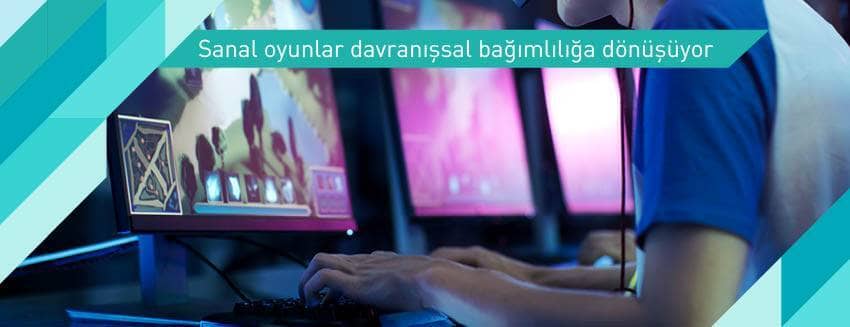
Virtual games lead to debates and confusion between the real and the unreal, and most importantly, to behavioral addiction. According to experts, parents should be role models and family time together should be increased. Depending on the age group, internet use and playing virtual games should be limited to 30 minutes to 1-2 hours.
In Russia, a 15-year-old boy killed a young woman in a scenario from his favorite computer game just because he was curious about what it felt like to kill people. The incident brought the use of the internet and the impact of virtual games to the agenda.
Psychiatry Specialist Assoc. Prof. Dr. Işıl Göğcegöz from Üsküdar University NPISTANBUL Hospital pointed out that the internet, which makes life easier in many areas, confronts young people and children with many dangers.
TURNS INTO BEHAVIORAL ADDICTION
"Virtual games normalize violent behavior due to the content of the game," Assoc. Prof. Dr. Işıl Göğcegöz said:
"At the same time, young people and children can be exposed to abuse by meeting people they do not know. Virtual games can bring many mental disorders along with these dangers. Playing games for hours can increase obesity, sleep disorders, headaches, as well as anger and aggressive behaviors. In addition, virtual games can turn into behavioral addiction over time.
VIRTUAL WAR ENTERS THEIR DREAMS
Stating that virtual games cause real and unreal concepts to be discussed and confused with each other, Assoc. Prof. Dr. Işıl Göğcegöz said, "In virtual games, an artificial environment created by hollowing out reality has replaced reality. Studies have also reported that young people who play violent virtual games continue to fight in their dreams and feel threatened. It also shows that these games negatively affect students' perception of trust in the classroom."
QUALITY OF INTRA-FAMILY COMMUNICATION SHOULD BE IMPROVED
Stating that parents should first question themselves in relation to internet use and virtual games, Assoc. Prof. Dr. Işıl Göğcegöz said, "Parents should be positive role models. It is very important to increase communication within the family and improve the quality of the time spent together. Teens and children should be supported to increase their social activities. As family activities and time spent with friends increase, young people will stay away from such dangers. In this way, we can withdraw our young people and children from the virtual world and make them aware of the real world."
SHOULD NOT EXCEED 2 HOURS A DAY
Stating that virtual games can have positive effects if the content of the game and the time used is appropriate according to the age group, Assoc. Prof. Dr. Işıl Göğcegöz warned, "In general, the use of the internet and social networks should not exceed 30 minutes to 1-2 hours according to the age group, and the daily use of virtual games should be limited."
REGULATION SHOULD BE MADE
Stating that the member states of the European Union and the United States of America have established age rating and content evaluation systems under the names of Pan European Game Information System (PEGI) and Entertainment Software Rating Board (ESRB) by taking into account their own social values for the evaluation of digital games in terms of content and classification according to age groups, Assoc. Prof. Dr. Işıl Göğcegöz said, "In Turkey, such an application is still insufficient. It is urgently necessary to develop and implement such a classification system in Turkey."
